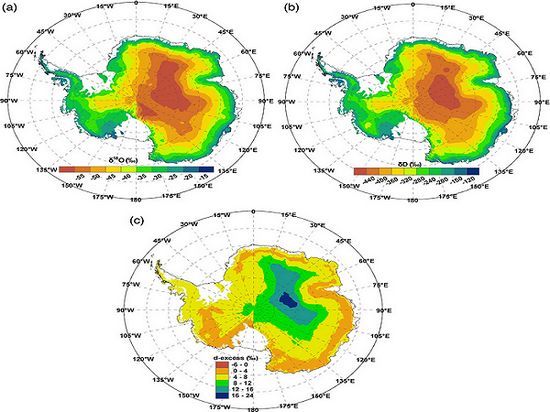A generalized additive model for the spatial distribution of stable isotopic composition in Antarctic surface snow
Updatetime:2011-03-30From:
【Enlarge】【Reduce】

(Modelled distribution of annual mean (a) δ18O and (b) δD, and d-excess in Antarctic snow obtained using the functions displayed in Figs. 3–5 to the RAMP/DEM.)(Image by Chemical Geology)
The generalized additive model for the spatial distribution of stable isotopic composition in Antarctic surface snowwas accomplished recently by the researchers of Cold and Arid Regions Environmental and Engineering Research Institute. The establishment of the model has the important significance for interpolating local surface snow isotopic composition over Antarctica both in terms of the low estimated errors and the possibility of understanding the processes that control stable isotopic composition in Antarctic surface snow, through the response curves of each independent variable.
It is claimed that this research provided the first evidence that GAMs could be regarded as a useful tool to estimate the distribution of δ18O,δD and d-excess in Antarctic surface snow. Using the most recent compilation of surface Antarctic snow isotopic composition data and a 1 km resolution digital elevation model (DEM), the generalized additive model (GAM) was used to develop a new gridded map of stable isotopic composition in Antarctic surface snow. The model explained 93.9% of the observed variance in the δ18O data, 92.7% of the observedδD variance and 66.6% of the observed deuterium excess. The performance of the model was evaluated by applying different quantitative approaches to the residuals from a cross-validation test. The researchers also presented and interpreted the resulting spatial variation patterns ofδ18O,δDand deuterium excess to better use in many hydrological and paleoclimate applications.
This programm was supported by the Chinese Academy of Sciences (SKLCSZZ-2008-06), National Natural Science Foundation of China (40825017), National Key Technology R&D Program (2006BAB18B01).
Appendix




